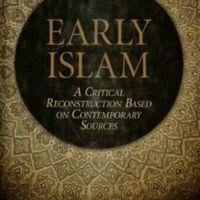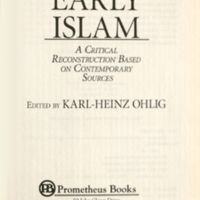Early Islam: A Critical Reconstruction Based on Contemporary Sources
Dublin Core
Title
Early Islam: A Critical Reconstruction Based on Contemporary Sources
Subject
Islam -- History
Description
"This successor volume to The Hidden Origins of Islam (edited by Karl-Heinz Ohlig and Gerd-R. Puin) continues the pioneering research begun in the first volume into the earliest development of Islam. Using coins, commemorative building inscriptions, and a rigorous linguistic analysis of the Koran along with Persian and Christian literature from the seventh and eighth centuries--when Islam was in its formative stages--five expert contributors attempt a reconstruction of this critical time period. Despite the scholarly nature of their work, the implications of their discoveries are startling: Islam originally emerged as a sect of Christianity. Its central theological tenets were influenced by a pre-Nicean, Syrian Christianity. Aramaic, the common language throughout the Near East for many centuries and the language of Syrian Christianity, significantly influenced the Arabic script and vocabulary used in the Koran. Finally, it was not until the end of the eighth and ninth centuries that Islam formed as a separate religion, and the Koran underwent a period of historical development of at least 200 years. Controversial and highly intriguing, this critical historical analysis reveals the beginning of Islam in a completely new light"
Publisher
Amherst, New York : Prometheus Books
Contributor
edited by Karl-Heinz Ohlig
Text Item Type Metadata
Original Format
Book
Citation
“Early Islam: A Critical Reconstruction Based on Contemporary Sources,” Humanities Hub, accessed February 27, 2026, https://humanitieshub.sdsu.edu/omeka/items/show/589.


